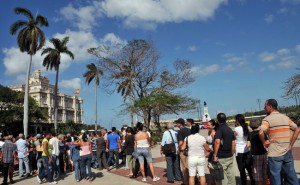
Armando wants to be an immigrant with swing. “God willing, in December I am traveling to Valencia, where I have relatives. I’m immersing myself in slang. I’ve seen tons of shows. And I use words like flipado, mola, mogollón, qué fuerte, tío, or vale” he says in a Spanish imitating that of the Spanish Consulate in Havana.
Since 2007, when the socialist government of Jose Luis Rodriguez Zapatero passed the Historical Memory, and within the so-called Law of Grandchildren, tens of thousands of Cubans all along the green caiman have embraced it.
Since it was put into force on December 29, 2008, the grandchildren of Spaniards may opt for dual citizenship. That day, the Consulate ran out of the 80,000 forms available.
Three years later the tide hasn’t receded. The deadline was extended until December 27, 2011. More than 165,000 applications were initially made, but the figure was reduced to over 140,000, of which some 60,000 Cubans, on meeting the requirements, have obtained Spanish citizenship.
Let’s visit the Consulate. Located on the corner Zulueta Street Jail, Old Havana, on the side of the bay. From early in the morning, groups of people are queuing up to be among the first when it opens.
Some come from afar. Antonio lives in Buey Arriba, in Granma province, 750 kilometers from the capital. He arrived 14 hours ago. With his backpack and a plastic bottle of tap water, soccer and baseball chat, with those who sleep in the line of the grandchildren of Spanish nationals residing in Cuba.
“My grandparents were from Zaragoza. I have cousins there. It has taken me some time to have the papers ready. My goal is to visit Spain, get a temporary job and return to Cuba. I do not want to emigrate, permanently,” said Antonio.
Let’s visit the Consulate. Located on the corner Zulueta Street Jail, Old Havana, on the side of the bay. From early in the morning, groups of people are queuing up to be among the first when it opens.
Some come from afar. Antonio lives in Buey Arriba, in Granma province, 750 kilometers from the capital. He arrived 14 hours ago. With his backpack and a plastic bottle of tap water, soccer and baseball chat, with those who sleep in the line of the grandchildren of Spanish nationals residing in Cuba.
“My grandparents were from Zaragoza. I have cousins there. It has taken me some time to have the papers ready. My goal is to visit Spain, get a temporary job and return to Cuba. I do not want to emigrate, permanently,” said Antonio.
The hours pass quickly for three young people sitting on a park bench opposite the former Presidential Palace, now the Museum of the Revolution. Ileana,A Lorenzo and Julian, chat about music and celebrity while passing a bottle of rum. They have become friends after seeing each other’s faces in several lines of foreign consulates.
Lorenzo and Julian met outside the Canadian Embassy. Two years ago, Lorenzo was looking for work. He heard a rumor that Canada needed strong young guys to cut down gigantic trees in inhospitable areas.
“I was the man. I looked for a long time for a way out of Cuba without having to throw myself into the sea. But in the end, or everything is a lie, or they ask for a number of documents you don’t possess. I met Julian there who was in the same. We were often at the U.S. consulate, as we have third-degree blood relatives in America. We got the bat (our visas denied). It was there that we became close with Ileana, who was also trying,” says Lorenzo.
Ileana is an authentic Galician granddaughter. “I would rather travel to the U.S., where I have family, because things aren’t so great in Spain. The crisis and unemployment, you know.”
To qualify for the visa you must demonstrate convincingly that you are the grandchild of a Spaniard. Those who do not, leaving consulate fuming.
Raudel is one of them. “My mother did not believe that this black girl had a Spanish grandfather. My story is incredible, but true. It turns out that my grandfather made my mother with a black woman in an extramarital affair, typical of certain ’Galicians’ settled in Cuba. Then my mother, a mulatto, married a black man. A stuck up consulate official can not understand the intricacies and love stories of many Spanish residents in Cuba.”
Orlando is white, but also leaves angry. “How ungrateful are these Spanish. We opened the door to their emigration in the last century when the situation in Spain was critical. Now they have an economic crisis and they want to commit suicide. What would they say if they lived in a country in perpetual crisis like Cuba. However, they shut the door in our face. “
If you want to hear stories about grandchildren or relatives of Spanish descent, pass along Zulueta Street. There’s everything there. From people like Armando who speaks like a Spaniard. Up to black Raudel, who swears he is the grandson of a Galician.
There are also the desperate. Those to whom all legal exit doors are closed. And they do crazy things. They are then a snack for sharks in the Florida Straits. Or die of hypothermia in the landing gear of an airplane. Like Adonis.
September 7 2011
